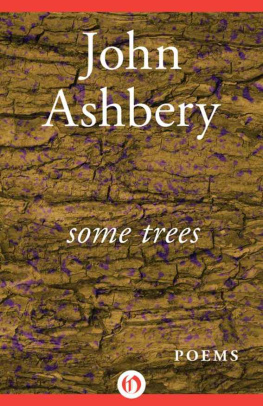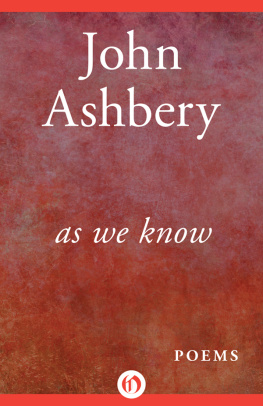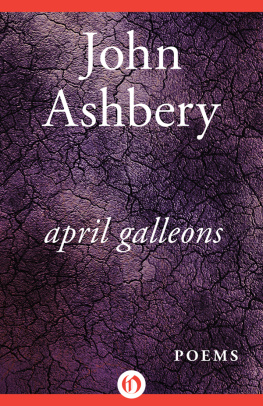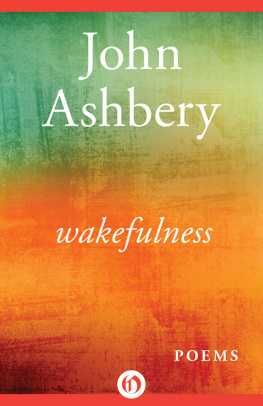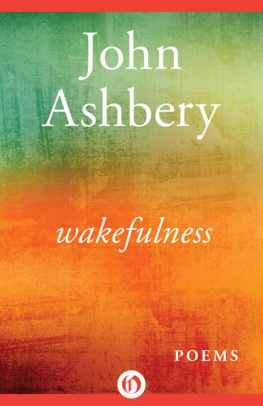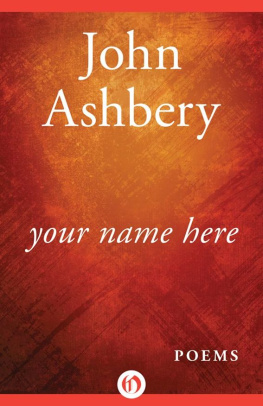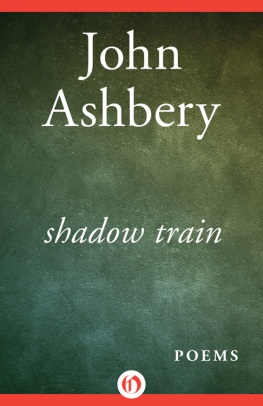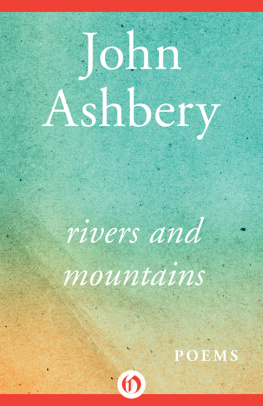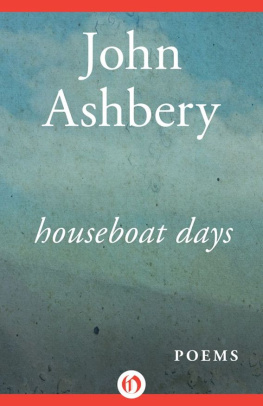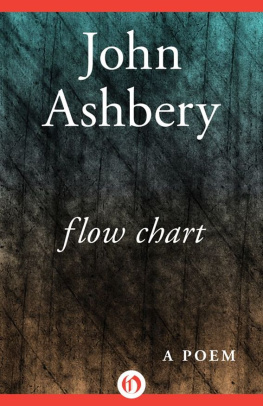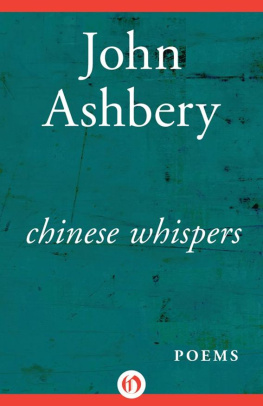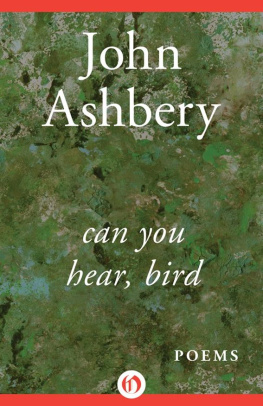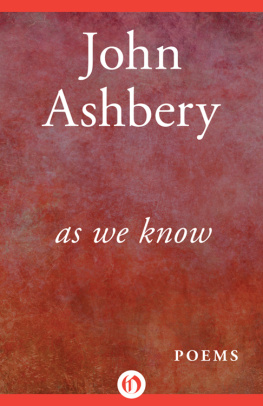John Ashbery [Ashbery - Some Trees: Poems
Here you can read online John Ashbery [Ashbery - Some Trees: Poems full text of the book (entire story) in english for free. Download pdf and epub, get meaning, cover and reviews about this ebook. year: 2014, publisher: Open Road Media, genre: Art. Description of the work, (preface) as well as reviews are available. Best literature library LitArk.com created for fans of good reading and offers a wide selection of genres:
Romance novel
Science fiction
Adventure
Detective
Science
History
Home and family
Prose
Art
Politics
Computer
Non-fiction
Religion
Business
Children
Humor
Choose a favorite category and find really read worthwhile books. Enjoy immersion in the world of imagination, feel the emotions of the characters or learn something new for yourself, make an fascinating discovery.
- Book:Some Trees: Poems
- Author:
- Publisher:Open Road Media
- Genre:
- Year:2014
- Rating:4 / 5
- Favourites:Add to favourites
- Your mark:
- 80
- 1
- 2
- 3
- 4
- 5
Some Trees: Poems: summary, description and annotation
We offer to read an annotation, description, summary or preface (depends on what the author of the book "Some Trees: Poems" wrote himself). If you haven't found the necessary information about the book — write in the comments, we will try to find it.
John Ashbery [Ashbery: author's other books
Who wrote Some Trees: Poems? Find out the surname, the name of the author of the book and a list of all author's works by series.
Some Trees: Poems — read online for free the complete book (whole text) full work
Below is the text of the book, divided by pages. System saving the place of the last page read, allows you to conveniently read the book "Some Trees: Poems" online for free, without having to search again every time where you left off. Put a bookmark, and you can go to the page where you finished reading at any time.
Font size:
Interval:
Bookmark:
 to my parents
to my parents It is not an abstract concept, and its qualities cannot be described generally or schematically. It cannot be associated reliably with the way we speak or breathe. Nor can its function be understood merely from its visual appearance on the page. Printed books altered our relationship to poetry by allowing us to see the lines more readily. What new challenges do electronic reading devices pose? In a printed book, the width of the page and the size of the type are fixed. Usually, because the page is wide enough and the type small enough, a line of poetry fits comfortably on the page: What you see is what youre supposed to hear as a unit of sound.
Sometimes, however, a long line may exceed the width of the page; the line continues, indented just below the beginning of the line. Readers of printed books have become accustomed to this convention, even if it may on some occasions seem ambiguousparticularly when some of the lines of a poem are already indented from the left-hand margin of the page. But unlike a printed book, which is stable, an ebook is a shape-shifter. Electronic type may be reflowed across a galaxy of applications and interfaces, across a variety of screens, from phone to tablet to computer. And because the reader of an ebook is empowered to change the size of the type, a poems original lineation may seem to be altered in many different ways. As the size of the type increases, the likelihood of any given line running over increases.
Our typesetting standard for poetry is designed to register that when a line of poetry exceeds the width of the screen, the resulting run-over line should be indented, as it might be in a printed book. Take a look at John Ashberys Disclaimer as it appears in two different type sizes. 
 Each of these versions of the poem has the same number of lines: the number that Ashbery intended. But if you look at the second, third, and fifth lines of the second stanza in the right-hand version of Disclaimer, youll see the automatic indent; in the fifth line, for instance, the word ahead drops down and is indented. The automatic indent not only makes poems easier to read electronically; it also helps to retain the rhythmic shape of the linethe unit of soundas the poet intended it. And to preserve the integrity of the line, words are never broken or hyphenated when the line must run over.
Each of these versions of the poem has the same number of lines: the number that Ashbery intended. But if you look at the second, third, and fifth lines of the second stanza in the right-hand version of Disclaimer, youll see the automatic indent; in the fifth line, for instance, the word ahead drops down and is indented. The automatic indent not only makes poems easier to read electronically; it also helps to retain the rhythmic shape of the linethe unit of soundas the poet intended it. And to preserve the integrity of the line, words are never broken or hyphenated when the line must run over.
Reading Disclaimer on the screen, you can be sure that the phrase you pause before the little bridge, sigh, and turn ahead is a complete line, while the phrase you pause before the little bridge, sigh, and turn is not. Open Road has adopted an electronic typesetting standard for poetry that ensures the clearest possible marking of both line breaks and stanza breaks, while at the same time handling the built-in function for resizing and reflowing text that all ereading devices possess. The first step is the appropriate semantic markup of the text, in which the formal elements distinguishing a poem, including lines, stanzas, and degrees of indentation, are tagged. Next, a style sheet that reads these tags must be designed, so that the formal elements of the poems are always displayed consistently. For instance, the style sheet reads the tags marking lines that the author himself has indented; should that indented line exceed the character capacity of a screen, the run-over part of the line will be indented further, and all such runovers will look the same. This combination of appropriate coding choices and style sheets makes it easy to display poems with complex indentations, no matter if the lines are metered or free, end-stopped or enjambed.
Ultimately, there may be no way to account for every single variation in the way in which the lines of a poem are disposed visually on an electronic reading device, just as rare variations may challenge the conventions of the printed page, but with rigorous quality assessment and scrupulous proofreading, nearly every poem can be set electronically in accordance with its authors intention. And in some regards, electronic typesetting increases our capacity to transcribe a poem accurately: In a printed book, there may be no way to distinguish a stanza break from a page break, but with an ereader, one has only to resize the text in question to discover if a break at the bottom of a page is intentional or accidental. Our goal in bringing out poetry in fully reflowable digital editions is to honor the sanctity of line and stanza as meticulously as possibleto allow readers to feel assured that the way the lines appear on the screen is an accurate embodiment of the way the author wants the lines to sound. Ever since poems began to be written down, the manner in which they ought to be written down has seemed equivocal; ambiguities have always resulted. By taking advantage of the technologies available in our time, our goal is to deliver the most satisfying reading experience possible.
The train comes bearing joy; The sparks it strikes illuminate the table. Destiny guides the water-pilot, and it is destiny. For long we hadnt heard so much news, such noise. The day was warm and pleasant. We see you in your hair, Air resting around the tips of mountains.
This is perhaps a day of general honesty Without example in the worlds history Though the fumes are not of a singular authority And indeed are dry as poverty. Terrific units are on an old man In the blue shadow of some paint cans As laughing cadets say, In the evening Everything has a schedule, if you can find out what it is.
Alton had been getting letters from his mother About the paymentshalf the flood Over and what about the net rest of the year? Who cares? Anyway (you know how thirsty they were) The extra worry began iton the Blue blue mountainshe never set foot And then and there. Meanwhile the host Mourned her quiet tenure. They all stayed chatting. No one did much about eating. The tears came and stopped, came and stopped, until Becoming the guano-lightened summer night landscape, All one glow, one mild laugh lasting ages. You laugh. You laugh.
Font size:
Interval:
Bookmark:
Similar books «Some Trees: Poems»
Look at similar books to Some Trees: Poems. We have selected literature similar in name and meaning in the hope of providing readers with more options to find new, interesting, not yet read works.
Discussion, reviews of the book Some Trees: Poems and just readers' own opinions. Leave your comments, write what you think about the work, its meaning or the main characters. Specify what exactly you liked and what you didn't like, and why you think so.

